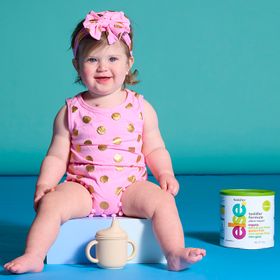Milk Allergy in Babies: Signs & Symptoms
Worried about milk allergy in your baby? Get the knowledge you need to keep your little one safe and healthy.
Updated May 30, 2024

When your baby gets sick, it’s a scary time. Wondering what could be causing their constant crying, skin conditions, or digestive troubles has the power to leave any parent restless. If your intuition tells you something is wrong, or you’re seeing abnormal symptoms and are concerned your child may be having an allergic reaction, it’s important to talk to your Pediatrician right away. However, you don’t have to wait for a reaction to be prepared to deal with one. When you know the signs of a milk allergy in babies, you’ll be better able to detect them early.
While it’s not common for babies to experience an intolerance of, or allergy to cow’s milk (only 2-3 percent of children under age 3 present with an allergy), it is one of the more common infant allergies, and thus, one of the first things to rule out if your child is experiencing symptoms. The signs of a milk allergy in babies are pretty visible, such as vomiting or the common milk allergy rash, while signs of an intolerance are invisible or hard to identify, such as indigestion and irritability.
» To provide a safe and nutritious alternative, consider this plant-based baby cereal
Signs and Symptoms of Cow's Milk Allergy in Babies
A milk allergy or lactose intolerance occurs when a child is allergic to either the casein or whey protein in cow’s milk. Their tiny body’s immune system reacts negatively to these proteins and releases histamines that cause allergic symptoms. Some of the common signs of a milk allergy in babies are:
- Hives
- Frequent spitting up
- Vomiting
- Throat itching
- Facial or tongue swelling
- Throat tightness
- Abdominal pain
- Excessive crying and irritability, particularly after feedings
- Diarrhea
- Blood in stool
- Scaly skin rash
- Coughing or wheezing
- Watery eyes and stuffy nose
- Trouble breathing or a bluish skin color
- Swelling of the mouth and/or throat
» Read more about milk alternatives that help reduce symptoms of allergy
In severe, life-threatening, cases, children may have an anaphylactic reaction, experience hypotension or lose consciousness.
Children sensitive to milk may also have something called Eosinophilic Esophagitis, which is where milk causes irritation and inflammation in the esophagus. The signs of this condition are:
- Difficulty swallowing
- Gagging
- Regurgitation
The milk allergy symptoms in toddlers are the same as the symptoms in babies. If your baby or toddler is exhibiting any of these signs or showing an alternative severe allergic reaction, it’s important to talk to your doctor right away as your child may have a cow’s milk allergy, which can manifest in serious symptoms. While many babies overcome a milk allergy by age one, some children don’t grow out of it until a bit later in life.
» Want to know if your toddler’s milk allergy is temporary? Read more here
Diagnosing a Cow’s Milk Allergy or Lactose Intolerance
If you have discovered a possible milk allergy or intolerance in your child, speaking to your pediatrician is the first point of action. There are a number of reasons, including other common food allergies, that could be causing the side effects you’re seeing.
Your Pediatrician may perform a skin test or observe your child’s behaviour and symptoms to diagnose him or her appropriately. They will likely prescribe an elimination diet that may start with eliminating cow’s milk and other dairy products from your child’s diet. If the signs of a cow’s milk allergy in your toddler or infant don’t go away, your doctor may also recommend eliminating other common allergens such as soy and eggs.
» Learn everything you need to know about allergens and milk allergy
With a breastfed infant, you will need to cut cow’s milk, dairy, and perhaps other foods from your diet so you don’t pass them on. If you are formula feeding or your child is at the age where they are consuming real foods, you’ll be in charge of eliminating these products from their meals and supplementing them with a dairy-free formula and/or dairy-free milk.
Of course, if you are breastfeeding, and don’t consume much cow’s milk, you may not notice a cow’s milk allergy or intolerance until your child reaches the age where they are old enough to drink cow’s milk on their own. If you begin to see dairy allergy symptoms in toddlers, or signs of an intolerance, swapping cow’s milk for a dairy-free alternative is essential.
An Alternative to Cow’s Milk
If your child is experiencing any of these symptoms, it’s important to find an equally nutritious alternative to cow’s milk to support their growth. Healthy little ones depend on the protein, fat, and essential vitamins found in cow’s milk, so it can feel daunting to find an acceptable alternative. The good news is there are alternatives to both cow’s milk and cow’s milk formula that will provide essential nutrition to your children.
» Looking for milk alternatives for your toddler’s sensitive stomach? Discover the best options here
Else Plant-Based Complete Nutrition is a delicious and vitamin-rich, dairy-free & soy-free nutrition drink for toddlers and babies over one year old. It is made with real whole foods and is a great source of protein, calcium, iron, fiber & healthy fats. Plus, it has less sugar than cow's milk and much less sugar than other cow’s milk alternatives such as toddler formulas and plant-based milks for adults.
The content and advice provided in this article is for informational purposes only and is not a substitute for medical diagnosis, treatment, advice for specific medical conditions. Always consult a pediatrician to understand the individual needs of your child.








